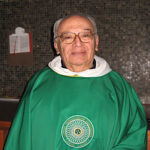Os Guinness, Christian writer and speaker, discussed the bracing challenges Christians face in the twenty-first century at a Faith and Law lecture on Capitol Hill on Friday, Sept. 11. He referred in the beginning to the different visions of the future seen by Immanuel Kant and Friedrich Nietzsche. Kant saw the universal victory of free societies in the world, the result of which would be “perpetual peace.” Nietzsche saw a “war of spirits.” Guinness offered the view that, at least for the future that was before Kant and Nietzsche, and on into our own day, Nietzsche’s vision has proved correct. But Guinness proposed that the world lives in a “war of spirits” in a more literal sense than secular scholarship would be likely to interpret Nietzsche. The conflict we see in the world is indeed in considerable measure resulting from a clash of spirits in the unseen world, as was shown to the prophet Daniel in the Bible.
We continue to live in a world, inaugurated by the Peace of Westphalia in the seventeenth century, which sealed the division of Christendom, in which there is no overarching authority or doctrine, but rather a cataclysmic clash of nations and ideas. The world wars attempted to end the anarchy of nations and ideas, but failed; today the Islamic State caliphate and Iranian mullahs are attempting the same thing. Another effort at unity is “culture war;” the term was originally used by Otto von Bismarck in nineteenth century Germany to refer to the effort to make national authority and modernity supreme over the Catholic Church. But Bismarck’s culture war pales by comparison to the culture war in America today, Guinness said. The contemporary culture war extends beyond the public square and into churches, with orthodox believers in every denomination having more in common with one another than revisionists in their own denominations. Evangelicals are not exempt from this, with young people from Evangelical backgrounds embracing universalism and the sexual revolution. So there is now a war of spirits in both the public and private worlds. To adequately engage this struggle, Guinness believes that we must face up to its core, the leftist detestation of religion in general and Christianity in particular. He held that the modernism that the secular world advances has done more harm to Christianity than all of the challenges of the past. Here one must distinguish between modernism and modernity. Guinness claimed that “modernism” refers to ideas, whereas “modernity” includes structures and institutions as well as ideas. One can become a postmodernist by changing one’s ideas, but one cannot move to a postmodern world. The structure of our world continues to be the structure of modernity.
But what does characterize the contemporary postmodernist, modern world? A shift in stance from appeal to authority to appeal to preference, according to Guinness. The important aspect of the choices we make is our act of choosing, not what was chosen. Christianity and Islam, are to the contrary, based on authority. Their ideas became the basis for authority in their civilizations. In modernity, however, there is a profound crisis of authority, a shift from integration to fragmentation. “The essence of the modern world is fragmentation,” Guinness claimed. Another term used to express the idea of fragmentation is “differentiation.” A person lives his or her life in different spheres unrelated to one another (e.g., work, home, church, etc.) Guinness used the term “California Christians” to express this (privately engaged with Christianity, but publicly irrelevant as far as their faith is concerned). Christians, as well as the secular world, have lost integration.
This fragmentation is accompanied by a shift from the supernatural world to the secular world. In the Biblical world, Elisha’s servant was shown the unseen army defending Elisha against the Syrians. The unseen world was really there. But many American Christians are “operational atheists,” Guinness said. Nevertheless, true Christian life is filled with the Holy Spirit. Ordinary people in the power of the Spirit are able to deliver from demons. Augustine was cited as an example of the difference that real belief in the supernatural makes. The early Augustine was what would today be called a cessationist, believing that the age of miracles is past. But the later Augustine came to believe in post-Biblical miracles; he documented “seventy miracles in Hippo alone.” This belief in contemporary supernaturalism was of great consequence to the Middle Ages, which saw the action of God and unseen spirits in the external world and ordinary life. Also, pilgrimages, holy places, saint’s relics, etc., were a major focus of piety, and a major maker of money. But as the church grew in secular power, actual supernaturalism went into the background. In the medieval pilgrimages, “the supernatural was isolated and sold,” according to Guinness. The Reformation rejected this. Calvin emphasized his theology of the Holy Spirit, but this did not continue with intensity as Reformed Christianity developed. The abstract theology and cessationism of Presbyterianism led to Presbyterians being regarded as the “frozen chosen.” The Enlightenment rejected even this academic faith. The result is modernity, which attempts “to live by bread alone.” Guinness held that the church in America is in consequence more American than Christian, with a meltdown of faith.
There is “no silver bullet” to solving this problem, Guinness said. But there is “something interconnected and all-embracing” here. What has gone wrong? Guinness referred to the opinion of Lord James Bryce, sometimes referred to as “the English Alexis de Tocqueville.” Active in the late nineteenth and early twentieth centuries, Bryce said that religion is very strong in America, stronger than in Europe, but Europe has tradition and social cohesion that America does not have. Only religion holds America together. Guinness said that Bryce predicted that “if religion goes, then there would be the most complete revolution of all.” The idea of such a meltdown has fascinated many people and important thinkers in the secularizing West, Guinness said. An example noted was Marx, who said the industrial revolution makes profane all that is sacred. “All that is solid melts.” Another thinker, Nietzsche, said that, “when God dies,” everything becomes “weightless.” Cultural meanings and norms have been destroyed.
Guinness summarized contemporary postmodern modernity as being characterized by three things: 1) Radical relativizing of certainties, 2) an incredible range of choices, and 3) rapidity of change. Freedom, faith, and family are melting down. The deepest challenge is social constructionism. We are held to live in a social constructed, not naturally existing, reality. There are “no givens, no rules, and no limits.” Robots will do better in this world than people, Guinness claimed.
“The Biblical antidote for meltdown is glory,” Guinness said. This “is the internal weightiness of God’s reality.” How do we bring God’s glory to bear on the contemporary world? he asked. His answer was that prayer and spiritual warfare must be applied to the current situation Christians find themselves in, not just ideas. But we need to be careful of the ideas we are using. There are two ways to assess ideas used at the present time, according to Guinness. One was a method advanced by Nietzsche, which Guinness called “the history of ideas.” We go back to an idea’s family tree to learn where it came from, how it developed, and how it influenced society. Ideas “wash down” from intellectuals to ordinary people over time, in this view. The emergent church within Evangelicalism is a good example of this. Enthusiastically embracing postmodernism, they did so in spite of the fact that much in the roots of postmodernism is incompatible with Christianity, with the result that emergents have come up with unorthodox ideas and some have denied the faith. They did not look at where their ideas came from, according to Guinness. The second method of assessing ideas is cultural analysis, which involves looking at how people’s existing cultural world shapes their thinking. For instance, the fast life is at the heart of modern life. Where did this feature of the modern world come from? It has no long history; it is a consequence of the applied science and technology which is found in the modern world.
At the heart of every Christian relationship is the incarnation, Guinness said. The glory of God, the reality of the supernatural, came into the world in the incarnation of Jesus Christ. Christians have received Jesus in their hearts, and this continuing presence ensures that we will not succumb to the seemingly irresistible force of secularization. By being united to Christ, who is one with God the Father, we can be, as we are called to be, in the world, but not of the world. The good, the true, and the beautiful which are found in the Kingdom of God may be helped by the modern world, or they may be harmed. We must be discerning, Guinness said. Christians in the twenty-first century need an incredible sense of discernment, which we find in Christ.
No comments yet





Leave a Reply